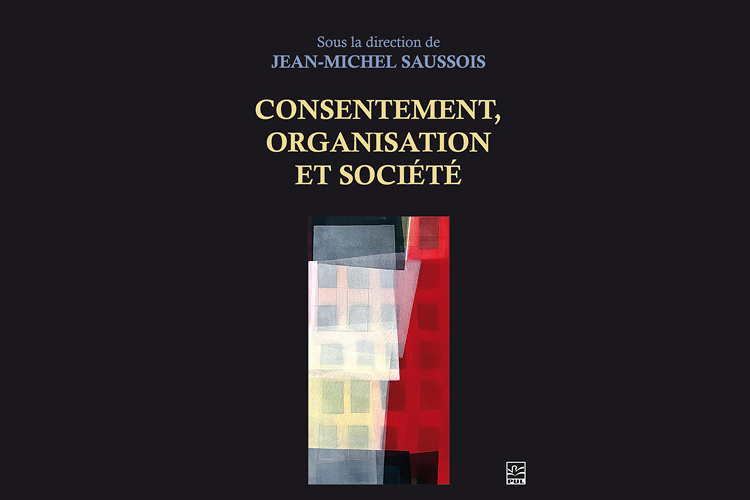What Does It Mean to Consent?
ESCP Research Explores Autonomy, Agreement and Power
A new interdisciplinary volume edited by Professor Jean-Michel Saussois interrogates how consent is shaped, constrained, and enacted across public, private, and professional life.
From accepting terms and conditions online to participating in workplace hierarchies or public health mandates, we are constantly asked to consent—but seldom invited to reflect on what that actually means.
Consentement, organisation et société (Consent, Organisation and Society), edited by Professor Jean-Michel Saussois, Emeritus Professor of Management at ESCP Business School, brings together voices from across the social sciences to critically examine consent not simply as a legal or interpersonal gesture, but as a complex social, cultural, and political process.
Published by Presses de l’Université Laval (PUL) and Hermann, and rooted in an ESCP-hosted colloquium (Consentir ? Pourquoi, comment et à quoi ?), the volume gathers interdisciplinary perspectives from sociology, economics, psychology, anthropology, law, and political theory.

A Word That Resists Simplification
Professor Saussois describes consent as a difficult, untranslatable, and ambivalent word—both a process and an outcome. Its ambiguity is precisely what makes it worthy of close scrutiny.
Rather than a clear-cut “yes” or “no,” the volume treats consent as a layered, situated act—one that often unfolds within pre-structured roles, expectations, or institutional frameworks. What appears to be voluntary may, in fact, be deeply shaped by surrounding conditions.
This ideal, he suggests, reveals the paradox at the heart of organisational life: the desire to secure obedience without force, engagement without questioning, and agreement without negotiation. Such dynamics underscore the importance of analysing not just whether people say “yes,” but how that yes is shaped, constrained, or internalised.
The volume explores how cultural norms, institutional design, and power relations shape what is framed as voluntary agreement. Contributors question whether everyday acts of “giving consent” are freely made—or quietly absorbed through habit, resignation, or lack of alternatives.
The managerial dream is to get employees to do things of their own volition—without pressure, without coercion, without the feeling of obeying an order.
 Emeritus Professor Jean-Michel Saussois
Emeritus Professor Jean-Michel SaussoisProfessor of Management
ESCP Business School
From Cerisy to ESCP: A Collective Inquiry
The intellectual roots of the volume trace back to a 2018 seminar in Cerisy-la-Salle on “work in transition,” where animated debates on subordination and agency laid the foundation for a new project. Building on those conversations, the ESCP colloquium Consentir ? Pourquoi, comment et à quoi ? brought together researchers to explore consent as a multidimensional social process.
The resulting volume opens up a set of classical yet urgent questions:
- Is a contract truly fair if the parties are unequal?
- Can silence, resignation, or habit be mistaken for agreement?
- What happens when autonomy is claimed, but outcomes are already shaped by external forces?
These tensions are especially visible in settings where consent is expected but not deliberated: the ticking of a data box, the implicit acceptance of workplace norms, or the passive participation in bureaucratic systems.
Between Academic Insight and Political Relevance
The book avoids neat resolutions. Instead, it surfaces the ambiguities and blind spots behind what appears to be clear assent. Several contributions engage with ideas of voluntary servitude, building on Étienne de La Boétie’s famous provocation: “Be resolved to serve no more, and you are free.”
Others revisit the concept of manufacturing consent—not just in its media-theoretical sense (as in Herman and Chomsky), but as a broader inquiry into how compliance is produced, ritualised, and absorbed across professional and civic life. In the book’s final chapter, Professor Benoît Heilbrunn, Professor of Marketing at ESCP, builds on the work of Edward Bernays and Walter Lippmann to introduce the concept of propagandé: a neologism that captures how modern marketing techniques work not just to sell products, but to shape collective perception and direct public belief.
Consent and the Social Contract: From Taxation to Climate
The book also engages critically with political consent, particularly in liberal democracies facing growing mistrust in institutions. As Professor Saussois notes, representative systems often operate on an assumed, prolonged form of consent—delegated, for instance, over the course of five-year electoral cycles—while the underlying social contract continues to evolve.
This tension becomes especially apparent in contexts where collective action is required, but public buy-in cannot be assumed. In her chapter, Valérie Guillard examines the case of climate transition. She argues that sustainable lifestyles cannot simply be enforced through policy—they must be understood, chosen, and acted upon. Consent, in this sense, is not just regulatory or behavioural; it is democratic. Without public participation and shared responsibility, ambitious climate measures risk rejection or indifference.
In a related vein, Jean-Marc Daniel, Professor of Economics at ESCP, reflects on the cultural discomfort surrounding fiscal consent. Drawing on historical and linguistic perspectives, he notes that in France, the word impôt (tax) shares its root with imposteur—a legacy that he suggests contributes to public scepticism. His chapter explores whether reframing taxation as a “contribution to the common good” might help rebuild civic trust and render public finance less contentious.
Whether addressing taxation or ecological responsibility, the volume makes clear that consent cannot be taken for granted where institutional asymmetries persist. It must be cultivated—through narrative, framing, and shared purpose.
When Saying “Yes” Isn’t Enough
Contributions to the volume also examine how consent is structured by organisational frameworks. Whether in academic publishing (“publish or perish”), digital labour, or the fashion industry, the issue is not just whether consent is given, but under what conditions it becomes meaningful or hollow.
From codetermination in corporate governance to resistance in institutional contexts, the book repeatedly returns to a key insight: consent is not just about saying “yes”—it is about having the real capacity to say no.
An ESCP-Led Reflection on Power and Participation
Consentement, organisation et société is deeply rooted in ESCP’s commitment to critical, interdisciplinary inquiry. By drawing from organisational studies, political theory, psychoanalysis, feminist philosophy, and labour sociology, the volume offers a textured and timely reflection on one of the most fraught concepts in modern life.
Rather than define consent once and for all, the project invites us to reconsider where consent lives—in words, in silence, in systems—and what it means to reclaim it.
About the Editor
Jean-Michel Saussois is Emeritus Professor of Management at ESCP Business School. A graduate of HEC with a doctorate in sociology, he is a recognised expert in public policy evaluation and the application of social sciences to management. His career spans leadership at ANVIE, consulting with the OECD, and numerous publications on public administration, knowledge management, and organisational theory.
Campuses
